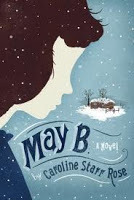Friday Feedback: If I Can't Go In Reverse, I'll Settle for Verse
 okay, fine, that's really me swooning in winter
okay, fine, that's really me swooning in winterso what?Meh. Groan all you want at the title of this post, I like it ;)
Anyway.
<------ This is me.
Swooning.
Lamenting the almost-end of summer.
I should really stop whining, but I can't.
Waaaaaah. I want my whole summer back.
But if it has to slip away, no one better to edge us gracefully toward fall and Back-to-School than the lovely, adorable, talented Caroline Starr Rose.
Trust me.
This is Caroline:
 See what I mean?Her first novel in verse, May B., was released to starred Kirkus and PW reviews:
See what I mean?Her first novel in verse, May B., was released to starred Kirkus and PW reviews:I've known it since last night:
It's been too long to expect them to return.
Something's happened.
May is helping out on a neighbor's Kansas prairie homestead—just until Christmas, says Pa. She wants to contribute, but it's hard to be separated from her family by 15 long, unfamiliar miles. Then the unthinkable happens: May is abandoned. Trapped in a tiny snow-covered sod house, isolated from family and neighbors, May must prepare for the oncoming winter. While fighting to survive, May's memories of her struggles with reading at school come back to haunt her. But she's determined to find her way home again. Show More Show Less
"If May is a brave, stubborn fighter, the short, free-verse lines are one-two punches in this Laura Ingalls Wilder–inspired ode to the human spirit." - Kirkus Reviews

I confess: My first writer-self was a poet. I didn't attempt stories or novels till adulthood.
My childhood, adolescence, and college years were spent writing poetry. I've even started two novels in verse -- well, one in verse, one with a verse component.
Yet, somehow, I'm scared of it now.
How does one turn a story from a bunch of poems to plot?
 a poetic little spot in my father's gardens. . .
a poetic little spot in my father's gardens. . . Well, here's the awesome thing for you (me). We've got Caroline here today, sharing just that. How she takes her stories from Poem to Plot. Here she is:
The more I write, the more I firmly believe there is no one way to write a book. I have yet to approach any of my manuscripts the same way. Here, though, are some things I’ve learned from both reading and writing verse novels:
Subject matter must be right for poetry
Some topics lend themselves more easily to poetry than others. Some subjects refuse to be written as prose. Many times an author will use verse to mimic the rhythm of the story. Here are a few books that come to mind:
Sharon Creech’s HEARTBEAT, about a girl who loves to run
Karen Hesse’s OUT OF THE DUST, where the spare language reflects the stark Dust Bowl setting
Lisa Schroeder’s FAR FROM YOU, about a girl who sings and and writes songs
Protagonists must be right for poetry
Often (though not always) verse novels are told from a very close first-person point of view. Such writing calls for a lot of introspection on the protagonist's part. Other times verse is used as a way for multiple voices to be heard, almost like a Greek chorus. Here are some examples:
Thanhha Lai’s INSIDE OUT AND BACK AGAIN, about a Vietnamese girl’s efforts to understand her new American home
Karen Hesse’s WITNESS, where the Ku Klux Klan moves into a quiet Vermont town, and citizens reflect on the change they bring
Poems should be able stand alone
Each poem in a verse novel must capture one moment, scene, idea, mark of change in your character's life. Poems should also be able to function separately from the rest of the story.
Poems must contribute to the whole
When I worked through my own verse novel, MAY B., I kept a quilt in mind, treating each poem like its own square of fabric. Each patch had to be able to function separately while at the same time move the story forward. I trusted that if certain patterns and shades in my story quilt were repeated (think themes or story strands), eventually the interconnectedness would surface -- a much more organic approach than is normally taken with prose.
Varied poem lengths
Some scenes flow, some end abruptly. Some thoughts wander, some jab. Without the structure of chapters, verse novels are simultaneously abrupt and fluid -- poem lengths can be jagged yet aide the plot in moving through scenes swiftly. It is often difficult to find a place to stop reading, as one poem often bleeds into the next.
Varied line lengths
Verse novelists play with key phrases or words they want to bring to their reader’s attention by the way they arrange words on the page. Line breaks can be used to slow down reading, to draw the eye to important phrases, and to best "speak" the poem.
Emotion and structure
The structure of a poem often communicates to readers a character’s emotional state.
How might fear look structurally? A verse novelist might use little punctuation or words tightly packed together. Maybe the language of the poem will unfold in short bursts, reminiscent of a child peeking into a darkened room and quickly slamming the door.
Poetic form
Some verse novelists use specific types of poetry (sonnets, for example), as Pat Brisson did with her book, THE BEST AND HARDEST THING. In writing about Sylvia Plath in YOUR OWN, SLYVIA, author Stephanie Hemphill chose to mirror the format of several of Plath's poems, giving her readers a sense of the poet's style, subject matter, intensity, and character.
The visual and the aural
When I was a teacher, I used to tell my students that poetry should be seen and heard. There is something special that happens when a reader experiences seeing, hearing, and saying a poem all at once -- the fullness of the poem is discovered this way.
*If you ever feel stuck with a verse novel, find a private corner and try reading it aloud.*
Verse novels aren’t books with strange line breaks. They are stories best communicated through the language, rhythm, imagery and structure of poetry. I hope you’ve found something here that sparks your imagination and helps you move from individual poems to a complete novel in verse.
Okay, seriously, I barely want to finish this post. I want to go work on my verse novels instead. :)
Anyway, because she is not only lovely, talented and adorable, but also awesome, Caroline's Friday Feedback excerpt is, yep, a poem from one of her WIP's. A historical novel in verse. So, here we go! Friday Feedback. You know the RULES (if you've got a poem today and want to share it, go ahead! Otherwise, feel free to post 3-5 paragraphs of your WIP).

It’s just a pigeon, Uncle said,
his big hands folding the bit of wood into mine.
What he carved is graceful in the way
its wings rest so daintily,
its neck gently curves.
This Uncle Samuel promised me:
pigeons return to their homes
no matter how far they fly.
A bird set free might wander
but will rejoin his flock.
At first,
I believed this was Uncle’s pledge to come back to me,
but when Father said we too
would make our way to Virginia,
I thought of something else:
What if a flight of pigeons followed the wandering one,
joining him on a journey entirely new?
Returning would not mean going back
but traveling onward;
reuniting with the missing one
would make them whole again.
Home isn’t only where you live,
it is also whom you love,
like they that call across an ocean
for your return.
- Caroline (& gae)
Published on August 17, 2012 08:34
No comments have been added yet.



